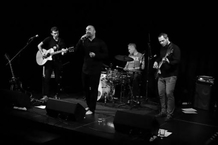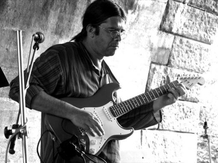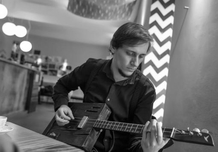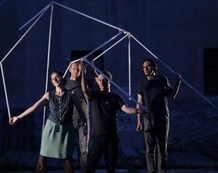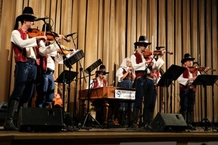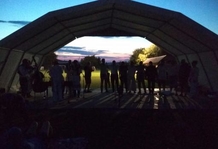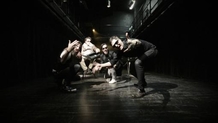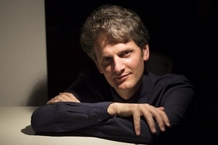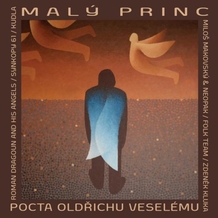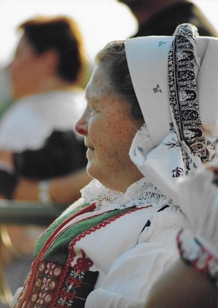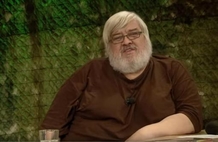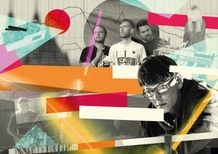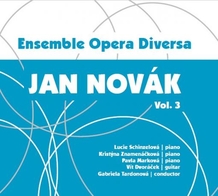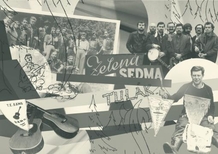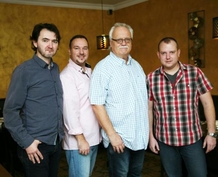Articles
Two years after the monothematic album Bleděmodré město (Pale Blue City), for which the Brno-based group Nevermore & Kosmonaut received a nomination for the genre-specific Anděl Award, the band released a new album with a mysterious name XCR-9. The subheading Písně do rakety (Songs for a Space Shuttle) reveal more. While on the last album we walked through the streets of the city of Brno together with Michal Šimíček and his band, this time the singer-songwriter, who has been using the nickname Kosmonaut for years, is taking us on a fictitious journey into space. more
Tiché lodi ('Silent Ships') is not a band, but a project of the guitarist and singer René Müller, who lives in Brno. While he recorded his previous album Časy vody ('Times of Water' – 2015) working together with Roman Cipísek Cerman, his former colleague from the band Hynkovy zámky ('Hynek's Locks'), Müller is now appearing all by himself on the new album – as writer of the music and lyrics, guitarist and singer, or – in his case more precisely – narrator. more
Until recently, this Brno singer with the shortest given and family names was the leader of the blues band The Weathermakers. He also led the ephemeral "tramping" group The Honzíci. However, the main thing that he attracts attention with – in addition to the guitars and other instruments that he produces under the brand Red Bird – is his original solo production. After the mature debut Město [The City] (2018), he has now made himself heard with a new album entitled Potom [After]. In the lyrics he goes down to the core again, being able to transform his personal problems into timeless stories and extraordinary poetic expressions. And even though he abandoned the blues form in most of his songs, the recording, in which Martin Kyšperský once again participated as a producer, has a blues nature by its very essence. more
Those who were captivated by the introductory distinctive song with surrealistic lyrics Z ježatých hor [From the Spiky Mountains] on the previous album of the Brno group Budoár Staré dámy [Boudoir of an Old Lady] (Sůl [Salt], 2017), can rejoice. The collaboration with the contemporary poet Lubor Kasal that began only three years ago has now resulted in an entire album of his texts set to music. However, the songs on the new album Kostřičky [Little Skeletons] have one more characteristic in common: the production and arrangement contribution by the multi-instrumentalist Tomáš Vtípil. more
Let us hope that Sunday's concert to mark the fifteenth anniversary of the great music band of the Brno-based Valášek Children's Ethnographic Ensemble (Dětský národopisný soubor Valášek) will not be the last event that ever-changing government regulations will allow. And even if that, God forbid, was the case, it would be a dignified farewell. more
The municipal council of Velká nad Veličkou decided already in mid-April that this year's Horňácké Festivities (original name: Horňácké slavnosti) would not take place on the traditional dates around the feast of St. Mary Magdalene, and their scope, previously meant to be of three to five days, would also be modified. Obviously, it was impossible to foresee the development of lockdown measures towards the third week of July, but musicians from the Horňácko district tried to come up with at least a partial alternative solution in order to maintain continuity. Eventually, two concerts were officially held on two consecutive Saturdays: On 18 July, live broadcast of a public radio recording of Czech Radio Brno under the title Hrajte že ně, hrajte aneb Horňácké trochu jinak (Play for Me, or Horňácké Festivities in a Slightly Different Fashion) took place at the Culture House in Velká nad Veličkou. A week later, at a sports complex in Javorník, a traditional competition for "the biggest expert on Horňácko peasant songs" was held under the auspices of the Horňácko Dulcimer Band of Libor Sup. Needless to say, both events have found their spectators and listeners. more
The Brno-based rock band Kulturní úderka (which translates loosely as "Culture Brigade"), led by singer and guitarist Štěpán Dokoupil, did not keep its fans waiting for too long this time. While there was a fifteen-year break between their first and second albums, the new album Black Metall was released less than two years after the previous album Sarajevská Katarzija (Sarajevo Catharsis). The name of the new album must be handled with care. Úderka has never had anything to do with black metal as a music genre. And once again, we are treated not to metal, but to relatively raw rock, which in some moments is pleasantly softened by the keyboard of Omer Blentič, or the trumpet of their guest artist Jan Kozelek. more
Cultural life has endeavoured to move into a sterile and "life-safe" social networking environment in an unequal struggle against the viral phantasm and government lockdown regulations. In the darkest months, music institutions competed with one another in staging recordings of memorable concerts, and major opera houses broadcast to the world those of their performances that gained the most success from spectators. more
Oldřich Veselý, a Brno-based singer, composer and keyboard player, died in January 2018. In February 2019, the 10th Brno Beatfest, dedicated to his memory, took place in the Semilasso music hall. And a year later, a CD recording of this concert was released under the title Malý princ [The Little Prince], complemented by several bonus items. more
On the twenty-fourth of May of this year, five days before her ninety-second birthday, Mrs. Anna Kománková passed away – and with her departed her particularly extensive songbook of ballads (not only) from the Javornicko and Horňácko districts, which she had always carried in her head. She was able to perform all the songs conserved in her memory in a distinctive and inimitable style. All her life she safeguarded the rare legacy of her ancestral heritage – all the more interestingly because she did not write down the hundreds of often complicated tunes and many dozens of verses and variants of ballads, but she knew them all by heart. Even after she reached the age of ninety, when she no longer enjoyed good health and did not perform in public, she remained in contact with the Javornický ženský sbor [Javorník Women's Choir], which she had revived and eventually led for many years. She never pushed herself forward anywhere, while at the same time she learned a lot from the skills of her ancestors: apart from singing (dozens of songs from the hymn-book and hundreds of folklore songs) she was an excellent embroiderer: She sewed and embroidered with her own hands every part of the folk costume she wore. more
When pronouncing the name Jiří ‘moravský’ Brabec (1955-2018) (the name is partly a pun referring to a typical Moravian dish called "moravský vrabec", which is pork roast with braised cabbage and dumplings – translator's note), anyone, who until recently had any business concerning the Czech-Moravian folk and country scene, is reminded of the unmistakeable figure of a mighty man wearing a beard, with a strong voice and an inexhaustible source of information, and an enviable general knowledge of not only the above-mentioned music genre. We are speaking here about a complicated but deservedly respected personality who was able to surprise us with his knowledge in a number of disciplines, but also with his self-deprecating humour and unexpected physical dexterity. Unfortunately, for the last time he surprised people around him with his sudden departure, only a few days before his sixty-third birthday in June 2018, almost unnoticed by the public media, for which he had worked for so many years. more
Electronic music, big beat and clubbing go together - but that’s only a small part of the truth. In fact electronic music was here long before clubbing, and thanks to enlightened teachers at JAMU it was doing very well indeed in Brno as early as the 1960s. That is, long before synthesizers and sequencers appeared on rock podiums, long before any old band had a computer, long before the first dance parties in glittering halls and dark cellars. Today electronic music is one of music’s most omnipresent genres: neither dance parties nor contemporary operas can do without it. Electronic big beat music has occupied reggae and swing, remixing is a daily affair, Brno artists have learned to sell instruments they built themselves to the whole world and to amplify an old knitting machine. As early as 1907 the composer Ferruccio Busoni dreamt of the future potential of electronic music, but not even his imagination and genius could have anticipated what Thaddeus Cahill’s first weird experiment with an immense electrical organ would lead to one day. more
Although cultural life has suffered significantly in the last two months, people's desire for an artistic experience has not faded. On the contrary – art and its role in our lives are perhaps needed even more than before. Hence, although concert halls are empty and listeners are forced to visit them only through recordings of their favourite concerts, a number of well-made music media created (not only) in the beginning of the year helps to bridge over this unfortunate period. more
”It’s a long journey to the West, / Pointless, fruitless is the longing,” began the first cowboy song recording issued by R. A. Dvorský’s publishing house in 1939. The theme and tone reflect the “tramping” movement, with its idealized vision of “America” and its unspoiled “nature”, which led Czechs to take to the woods, where they hiked, met round campfires and sang songs modelled on American folk songs and country music. So widespread was the tramping phenomenon that it made its way into popular music, where it long remained. Over time, the romance of the cowboy and the idea of a free life on the Great Plains found their way not only into songs sung by such late twenti- eth-century stars as Karel Gott, Helena Vondráčková and Waldemar Matuška but into social life itself: very few countries in Europe have such liberal laws when it comes to sleeping overnight, or even setting up camp, in the woods. In the past young people in Brno could choose whether to be “city slickers” hooked on discotheques or “wander- ers”, who would head for the main train station every Friday afternoon or Saturday and from there set out on the first train for wherever in the countryside it was heading to. more
Bands that have been present on the scene for several decades have two options: Either they make a living from their own substance, and therefore from hits of the past. Or they are still trying to come up with something new, sometimes with the wishes of conservative fans in spite of it. The "Brno-based" group Poutníci (meaning Pilgrims in Czech), who are celebrating their 50th anniversary this year, are somewhere halfway in between. They still play Panenka [The Doll], which the audience demands, but fortunately they didn't get stuck and – maybe after a long time, but still – they come up with a new serial album, which should not pass unbeknown to the fans of Czech country and bluegrass. more
Another of the jazz evenings regularly organised by the Brno Philharmonic was dedicated to the duo Will Vinson (alto saxophone) and Aaron Parks (piano). These musicians have been working together in various formations for twenty years. So they decided that it was time to try the most intimate and, according to many, the most difficult - playing as a mere duo. These mid-generation jazz musicians performed a selection of classical jazz material as well as several of their own compositions on Monday 10 March at the Besední dům. more
This year's first concert by the Brno Contemporary Orchestra from the Auscultation series was entitled Gastro (Cuisine), or Dinner for Magdalena Dobromila Rettig (1785-1845). On Sunday, 2 February, the orchestra performed two compositions, or rather performances and happenings by Ondřej Adámek (*1979), who also conducted the pieces, in the dining room of the Masaryk Student House. This was a fairly unusual situation for the audience, when conductor Pavel Šnajdr did not take his place at the head of the orchestra. more
The fourth concert in the Brno Philharmonic's Philharmonic at Home subscription series, subtitled Metamorphoses and conducted by Dennis Russell Davies, was dedicated to works by Joseph Haydn, Antonín Rejcha and Richard Strauss. Pianist Ivan Ilić was originally scheduled to appear as soloist in Rejcha's Piano Concerto, but for health reasons he cancelled the concert. Jan Bartoš promptly took over, enabling the audience to hear the original programme on Thursday 30 January at the Besední dům. more
The Brno Philharmonic's New Year's concert on 1 January at the Janáček Theatre is already a well-established tradition. This year was no exception, and the orchestra, led by conductor Michel Tabachnik, gave a performance consisting mainly of works by Johann Strauss the Younger. This was the Brno Philharmonic Orchestra's show opening the 'Strauss Year'. After all, 2025 is the 200th anniversary of the birth of the composer, dubbed the king of waltzes. Strauss's compositions were accompanied by works by Erich Wolfgang Korngold, Richard Strauss and Dimitri Shostakovich. more
"Culture is a Bridge" was the theme of the second Czech-Austrian Partnership Concert, held on Friday, 20 December at Schloss Thalheim. It was the final evening of the 5th year of the pan-European project Czech Dreams 2024, and also part of the celebrations of the Year of Czech Music and the Concentus Moraviae international music festival. Culture is a bridge that connects not only different generations and social classes, but also entire nations. And the Czech Dreams project, which in 2024 alone presented music by Czech composers in 25 European cities in 17 different countries, is an eloquent example of this. In December alone, besides the final concert in Austria, six more concerts were performed in southern Europe, from Amarante in Portugal to Varaždin in Croatia. The concert was dedicated to the Lower Austrian Governor Erwin Pröll, who has long been committed to building and deepening relations between the Czech Republic and Austria. more
Christmas in Brno also means the traditional pre-Christmas concert of the Brno Contemporary Orchestra (BCO), this time entitled From America to Tuřany. It took place on 18th December and after a one-year break it returned to the Sokol Hall in Tuřany. The BCO, conducted by Pavel Šnajdr, performed works by Mauricio Kagel, Steve Reich, Trevor Grahl and, as always, Miloslav Kabeláč. Appearing together with the orchestra were four singers, Aneta Podracká Bendová, Kornél Mikecz, Michal Kuča and Martin Kotulan. At the end of the first half, Pavel Šnajdr set aside his baton and clapped the beat, joined by Petr Hladík. more
The now world-famous Swedish band Dirty Loops finished their autumn European tour on Saturday, 30 November at Brno's Metro Music Bar. The band featured on the programme of the seventeenth annual Groove Brno funk, soul and jazz festival. The virtuoso trio, consisting of Jonah Nilsson - vocals and keyboards, Henrik Linder - bass guitar and Aron Mellergård - drums, are famous for their flawless technical proficiency, sophisticated original compositions and cover versions of well-known numbers, especially pop songs. However, these songs are often reharmonised in their arrangements and the style is more a combination of disco, pop and jazz fusion. To avoid having to resort to using pre-recorded backing tracks, the trio was joined on tour by keyboardist and vocalist Kristian Kraftling. more
Ensemble Opera Diversa put a distinctive "spin" on its last orchestral concert of the year. It took place on 26 November at the Alterna music club, which is more a rock, electronica and indie pop hangout than an artistic music venue. The pair of selected pieces consisting of Vojtěch Dlask's premièred work Querell Songs for soprano saxophone and strings and Miloslav Ištvan's Hard Blues for pop-baritone, soprano, reciter and chamber ensemble also reflected this. Naturally, it was Ištvan's Hard Blues that gave the evening its name - the clash of the artistic, composed and purposefully "artistic" world (not meant pejoratively) with authentic African-American musical expressions springing from the depths of the soul of a man tested by life formed as the centre of the evening. This was not merely a stylistic inspiration, but more thematic, which was also evident in the opening piece of the evening. This was the composition Querelle Songs, inspired by Jean Genet's novel, previously dedicated to Ensemble Opera Diversa, but this time in a new instrumentation. more
Leoš Janáček's (1854-1928) Moravian national opera Jenůfa was brought to Brno for the Janáček Brno 2024 festival by the Moravian Theatre Olomouc in a co-production with the Janáček Opera NdB. Rather than using the Czech title Její pastorkyňa, the production team, headed by director Veronika Kos Loulová, decided to stage the work as Jenůfa, the name under which it is performed abroad. On Wednesday, 20 November, five days after its première in Olomouc, the audience at the Mahen Theatre could also see the latest domestic take on Janáček's most widely performed opera. The musical staging of the significantly modified original version from 1904 was the work of conductor Anna Novotná Pešková, and the main roles were played by Barbora Perná (Jenůfa), Eliška Gattringerová (Kostelnička), Josef Moravec (Laca Klemeň) and Roman Hasymau (Števa Buryja). more
The office of Brno - UNESCO City of Music, with the financial support of the South Moravian Region, presents a line-up of active folklore groups (ensembles, chasers, musics) in the Brno region as part of the Year of Folklore Ensembles. more
Trumpeter Jiří Kotača founded the big band Cotatcha Orchestra ten years ago. Nowadays, he performs a variety of programmes ranging from the most traditional jazz to a visionary fusion of jazz and electronica. We chatted with Jiří Kotača about how the orchestra has gradually developed, how the original repertoire is blurring the boundaries between jazz and electronica, and also about what fans can expect from the November concert to celebrate the orchestra's 10th anniversary. We also talk about Kotača's International Quartet, as well as how the trumpet and flugelhorn can be enriched with effects. more
On Saturday, 24 August, the Korean radio orchestra KBS Symphony Orchestra with its musical director - Finnish conductor and violinist Pietari Inkinen - came to Brno's Špilberk Festival with an exclusively romantic repertoire. The invitation was also accepted by South Korean violinist Bomsori Kim, a graduate of the prestigious Julliard School. more
For a quarter of a century now, the Brno Philharmonic has been organising the Špilberk Festival at the end of August in the courtyard of the castle of the same name. Four open-air musical evenings offer the audience a selection of concerts featuring classical, film and computer music, as well as often jazz and other genres. This makes it a diverse mix of performers and repertoires with an often pleasant, summery, laid-back ambience. This year's big and rapdily sold-out attraction was the Wednesday evening of 21 August, full of melodies from the James Bond films, performed by the Czech National Symphony Orchestra, headed by world-renowned conductor, composer and arranger Steven Mercurio. During the concert, the audience also got to enjoy singers Sara Milfajtová, Vendula Příhodová and David Kraus. more
As part of its European tour, the Taiwanese Taipei Philharmonic Chamber Choir (TPCC), under the direction of artistic director and choirmaster Dr. YuChung Johnny Ku, took the city up on its invitation and visited Brno. The concert was held on Monday, 13th August in the hall of the newly renovated Passage Hotel. more
The final concert of this year's season of the Brno Philharmonic was devoted to works by Antonín Dvořák and Jean Sibelius at the Janáček Theatre. On Thursday, 20 June, Danish conductor Michael Schønwandt, who had not appeared before a Brno audience since January last year, took the lead of the Philharmonic. In the first half of the programme, the orchestra was accompanied by violinist Alexander Sitkovetsky. more
Editorial
In mid-June, the Brno City Theatre will be hosting a festival showcase of professional theatre entitled Dokořán (Open Doors for) Musical Theatre, the only festival dedicated to presenting contemporary musical theatre works. The festival's dramaturgs have compiled a selection of ten of the most interesting productions representing the best currently on offer on stages at home and abroad. The show will be complemented by an exhibition marking 80 years of the Brno City Theatre, as well as a concert by Meteor from Prague. more
The Brno Philharmonic is to perform one of the 20th century's most demanding symphonies. Cellist Steven Isserlis will also be appearing
One of the world's finest cellists and one of the 20th century's most challenging symphonies. This is the programme of Schumann and Shostakovich, a concert the Brno Philharmonic has been preparing for this week. Steven Isserlis is coming to Brno to perform Robert Schumann' s Cello Concerto. more
Brno flautist Michaela Koudelková seeks support for her debut CD
Flautist Michaela Koudelková has launched a Hithit campaign to raise funds for the release of her first CD featuring sonatas by G. F. Handel and A. Corelli on the renowned SUPRAPHON label. The project will showcase the virtuosity of Czech musical artists. The choice of repertoire is also unique, as it is almost unheard of performed on the recorder. more
The thirtieth anniversary year of the Concentus Moraviae Festival is subtitled "Rondo Festivo"
The Concentus Moraviae International Music Festival celebrates its thirtieth birthday this year. From May to June it will offer its fans almost forty concerts in impressive venues in twenty festival towns and cities. The festival dramaturgy has been prepared by Jelle Dierickx, who has dubbed the whole event "Rondo Festivo". The playful title is a nod to the festive anniversary year as well as this year's artist in residence, French keyboard virtuoso and composer Jean Rondeau. more
Just in: Martin Glaser appointed Director of the National Theatre. He wants to stay in Brno until July 2028
Today, Culture Minister Martin Baxa announced the results of the selection process for the new General Director of the National Theatre and appointed Martin Glaser to the post. He is expected to start on 1 August 2028. more
Kantiléna is heading off on a US tour to join forces with a prestigious local choir
Nine days, three cities, four concerts, 51 young singers. Kantiléna, the children's and youth choir of the Brno Philharmonic, is preparing for a prestigious American tour, presenting mainly Czech composers to local audiences. more
Manon Lescaut returns to the Janáček Theatre after more than fifty years
After more than 50 years, a new production of Puccini's Manon Lescaut returns to the Janáček Theatre as the opera directorial debut of Štěpán Pácl and with music conducted by Ondrej Olos. more
Dinner that you do not eat, but listen to - the Brno Contemporary Orchestra invites you to a Culinary concert
The Brno Contemporary Orchestra (BCO) will be serving up a Culinary concert that will show that sounds can be as captivating as the most refined dishes. The event will take place in the dining room of the Masaryk Student Home in Brno and is subtitled "Dinner for Magdalena Dobromila Rettig". However, do not expect food on the table, but music - the main course will be the musical works of Ondřej Adámek. more
The National Theatre Brno is organising a meeting of lecturers from the field of culture
The National Theatre Brno invites Brno lecturers, educators in culture and anyone working in audience education at cultural and educational institutions to come along to a joint meeting at the Janáček Theatre. more
A gig by hypnotic British trio Mammal Hands combining jazz and electronics will open the twenty-fourth annual JazzFestBrno festival at the Fléda club. Newly additions to the line-up are the May concerts of pianist Nikol Bóková with her trio, double bassist Klára Pudláková with MAOMAH, and guitarist David Dorůžka, who will be launching a new joint album with the Piotr Wyleżoł Quartet entitled When the Child Was a Child. From the beginning of February to May, the festival will offer thirteen gigs by some top world jazz stars, as well as performances with a club atmosphere from the Club Life series in the stylish Cabaret des Péchés. more





